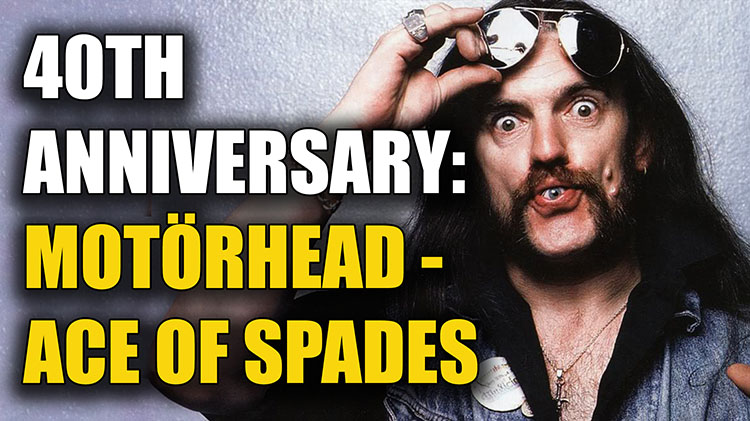Written by Caitlin Vaughn Carlos
On October 27, 1980, Motörhead released their latest single, “Ace of Spades” in anticipation of their fourth studio album of the same name. At its release, Gary Bushnell wrote for Sounds magazine: “The new single ‘Ace Of Spades’ kicks off side one at a pace so ferocious it makes the UK Subs sound like doddering old men playing the spoons.” In 2015, David Swanson wrote “Beneath the speed and aggression sits a near-perfect blues song at its core. They just fed that blues a handful of amphetamines. The result is about as perfect a rock and roll statement as Lemmy (or anyone, for that matter) has ever made.” The song’s lasting legacy was confirmed when VH1 named the song tenth on its 2009 list of “Top 100 Greatest Hard Rock Songs of All Time.”
By the time Motörhead had released “Ace of Spades” they were a seasoned band with even more years of experience as individuals in the UK music scene. The band was formed in 1975 after bassist Ian “Lemmy” Kilmester had been dismissed from Hawkwind. He first recruited guitarist Larry Wallis and drummer Lucas Fox. Fox was quickly replaced with Phil “Philthy Animal” Taylor and by 1976, “Fast” Eddie Clarke had joined the group as a second guitarist. With Wallis’ departure soon after Clarke’s audition, Motörhead was left with the band’s now-iconic trio of Lemmy, Taylor and Clarke.
The band is commonly viewed as a heavy metal group, but their embracing of punk attitude and speed made them early pioneers in the speed and thrash metal sounds. Allmusic’s Stephen Thomas Erlewine described the band saying: “Motörhead’s overwhelmingly loud and fast style of heavy metal was one of the most groundbreaking styles the genre had to offer in the late ’70s” and though “Motörhead wasn’t punk rock … they were the first metal band to harness that energy and, in the process, they created speed metal and thrash metal.” Lemmy has stated that in forming Motörhead, he wanted to create a band that would play loud, fast rock and roll. He described that they would “concentrate on very basic music: loud, fast, city, raucous, arrogant, paranoid, speedfreak rock n roll … it will be so loud that if we move in next door to you, your lawn will die.”
And that’s exactly what they did. In their previous three albums, the band had created a reputation for playing face melting rock and roll, and picked up a devoted following along the way. Reviewing the Ace of Spades album, Bushnell details the experience of listening to the album as an overwhelming, sensational journey from start to finish concluding: “When I finally recovered my senses I wrote ‘There’s no two ways about it, Motörhead ARE heavy metal in the only meaningful sense of the term. Everyone else is just pretending.’” The album’s title track certainly lived up to this claim.
From the moment audiences heard Lemmy’s aggressive and exhilarating bass introduction on “Ace of Spades,” they were hooked. Seconds later, Taylor’s machine-gun drum-fill set the band off on some of the most thrilling and high-speed two minutes and 46 seconds in rock history. Unrestrained energy is certainly one of the band’s defining features, but with “Ace of Spades” the band took it a step further, creating an irresistible thrillride – a rock and roll roller-coaster – that immediately hooks you in, and won’t let you off until the band is ready to let you go. The song is like an addiction and in 1980, this heavy metal giant took the music industry – distracted by the glitter of new wave and post-disco dance music, and still recovering from the shock of punk – by surprise. It enthralled widespread audiences and inspired generations of hard rockers to come.
Lyrically, the song relies on gambling metaphors, specifically games of cards or dice (although Lemmy has said: “when it comes to that sort of thing, I’m more into the one-arm bandits actually, but you can’t really sing about spinning fruit, and the wheels coming down”). The gambling imagery depicts a life of thrill-seeking and risk. The Ace of Spades is not employed simply as the highest ranking card in these games, but also for the symbolism it holds as the “death card.” The high-stakes thrill in the song does not come from gambling money, but instead, playing with life and death. In fact, the lyrics during the bridge further illustrate the reckless regard the gambler holds for the risks of the game, as Lemmy sings “You know I’m born to lose, and gambling’s for fools / But that’s the way I like it baby, I don’t wanna live forever.”
SEE ALSO:
5 Delay Mixing Tricks
Drum Mixing Basics
Mixing: Headphones Vs Monitors
“Ace of Spades” continues to defy any notion of ever fading away. In January 2016, following the November and December 2015 deaths of Taylor and Lemmy, respectively, the song saw a resurgence of attention, landing in the top 15 on several Billboard charts. The 2018 death of Clarke marked the loss of the last remaining member of the band’s classic lineup. However, Motörhead’s legacy carries on in the classic albums and tracks that the band has left behind. Motörhead was nominated for the Rock and Roll Hall of Fame in 2020, and while it was not chosen for this year’s class of inductees, it is certainly only a matter of time. The band stands to this day as one of the most energetic and exhilarating rock and roll bands in history, and also one of the most influential. 40 years later, we can look back and see “Ace of Spades” living on as one of Motörhead’s defining anthems, carrying on the legacy of a band that captured rock’s rebellious spirit and redefined what the sound, volume and speed of rock and roll could be.
